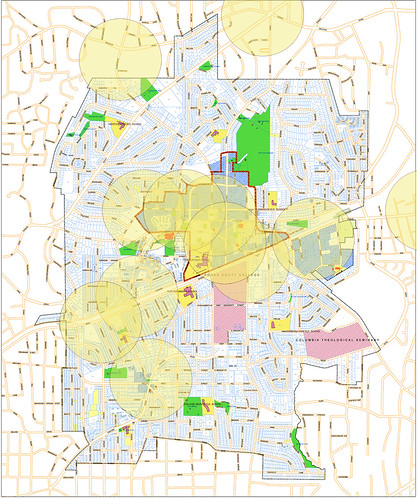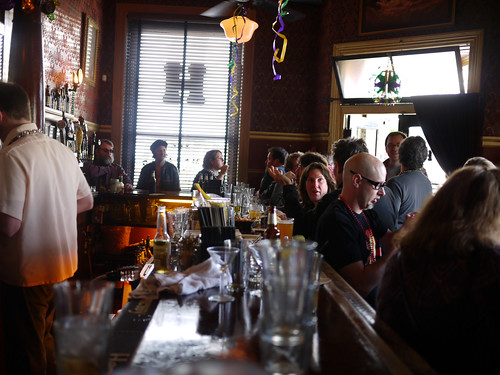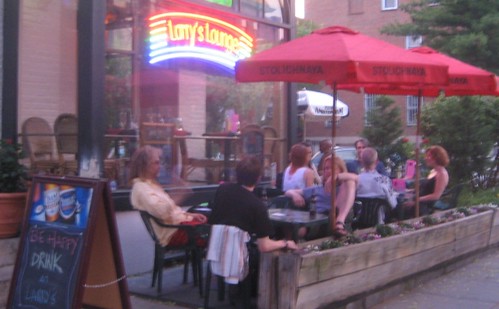Does a sustainable community need a good drinking establishment?

Posted May 31, 2012 at 1:28PM
My friend Eliot Allen first introduced me to the concept of neighborhood completeness: that the quality of a place is defined in part by how many different functions it has in close proximity to homes and to each other. Eliot was closely involved in the creation of the LEED for Neighborhood Development green rating system, and the concept made it into the system. LEED-ND gives credit toward certification for a development that contains, or locates near, certain categories of “diverse uses”: supermarket, pharmacy, restaurant, child care facility, library, and so on.
I was part of the LEED-ND team as well, and I note that we did not list “bar” or “pub” as a credit-worthy neighborhood asset. But Michael Hickey, a community development consultant, makes a good case for their inclusion as “third spaces,” or community hangouts. In an article titled “In Praise of (Loud, Stinky) Bars” and posted last week in the National Housing Institute’s Rooflines blog, Hickey writes:
“The vaunted ‘third space’ isn’t home, and isn’t work—it’s more like the living room of society at large. It’s a place where you are neither family nor co-worker, and yet where the values, interests, gossip, complaints and inspirations of these two other spheres intersect. It’s a place at least one step removed from the structures of work and home, more random, and yet familiar enough to breed a sense of identity and connection. It’s a place of both possibility and comfort, where the unexpected and the mundane transcend and mingle.
“And nine times out of ten, it’s a bar.”
Later in the article, Hickey posits that bars support community life in a valuable way that other establishments do not:
“We shouldn’t romanticize third spaces as only being about brightly lit cafes, pedestrianized streets, and the local public library. Bars work in their scruffy way by offering a place to get away from an overcrowded apartment or a squalid loft or a grimy job. They are a place where someone with little to spare can go for a change of pace . . .
“The goal of a bar patron is to enjoy the primary benefit of any decent third space: a place to linger. I’m still looking for someone to generate a ‘lingering index’ so that we can measure the impact of just plain old hanging out – but that’s really at the heart of place-making, and we shouldn’t forget it.”
I love the idea of a “lingering index.” It’s right up Eliot Allen’s alley, actually, since I think of him is the master of metrics in the city planning world (example here).
What does this have to do with sustainability? Well, quite a bit, in my opinion. The more complete our neighborhoods, the less we have to travel to seek out goods, services and amenities. The less we have to travel, the more we can reduce emissions. People enjoy hanging out in bars and, especially if they are within walking distance of homes, we can also reduce the very serious risks that can accompany drinking and driving.

On that subject, my friend Scott Doyon has gone so far as to map “pub sheds,” or five-minute walking zones from pubs in the Atlanta suburb of Decatur. Writing in his firm’s excellent blog PlaceShakers and NewsMakers, Scott concludes that the community is fairly well covered. He further suggests that, if one extends the walkability zones to ten-minute distances, it would be well-covered indeed.
Like Hickey, Scott salutes the contributions that neighborhood bars can make to community cohesion:
“My town of Decatur, Georgia — already pretty walkable, especially by Sun Belt standards — has, for the past 15 years or so, been developing a thriving pub scene. In addition to some long-time institutions already in place, we now have a growing number of neighborhood-friendly taverns spread around town.
“These are where neighbors go, hang out, and get to know each other, and they’ve contributed to the fact that, here in Decatur, craft beer has pretty much become a de facto component of the city’s economic development strategy.”
Later in the article, Scott adds that, “If ever there was a business you should be walking to (and from) rather than driving, it’s your bar.” Agreed.
I might add that, in the download age – which has already killed music stores, weakened movie theatres, put print newspapers on life support, and finished off all but a few bookstores – the remaining places where there is a sort of shared community commons are becoming ever more important. Bars qualify: you can’t download a pint of Guinness.
Related posts:
- The greening of Guinness (March 16, 2012)
- Stay thirsty, my friends: Whisky power is displacing fossil fuels (March 6, 2012)
- Whisky = Power in Scotland. Really. (June 14, 2011)
- What does community mean to you? (June 7, 2011)
- A new perspective on auto dependence: it hurts drinkers, too (January 6, 2009)
Move your cursor over the images for credit information.

